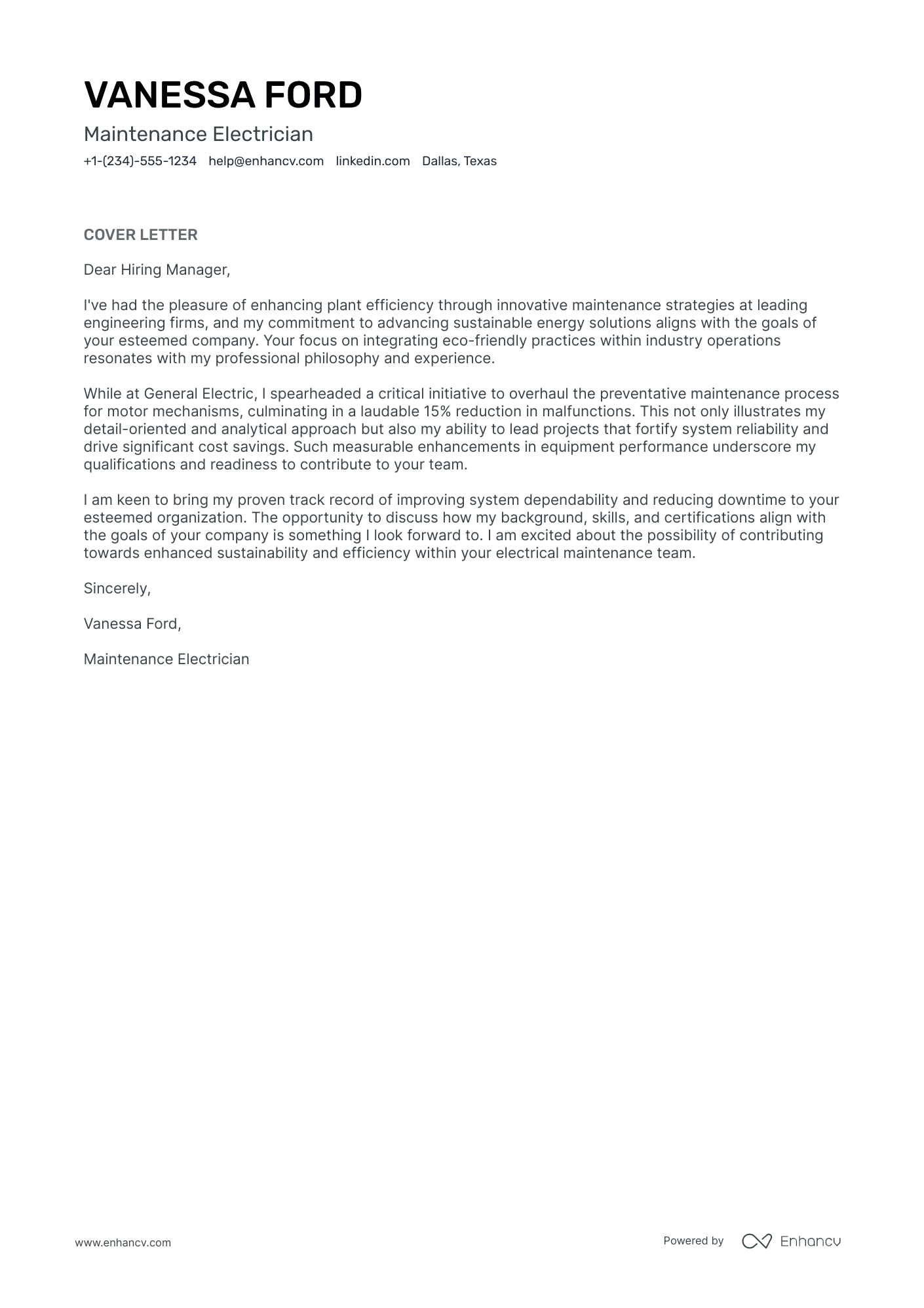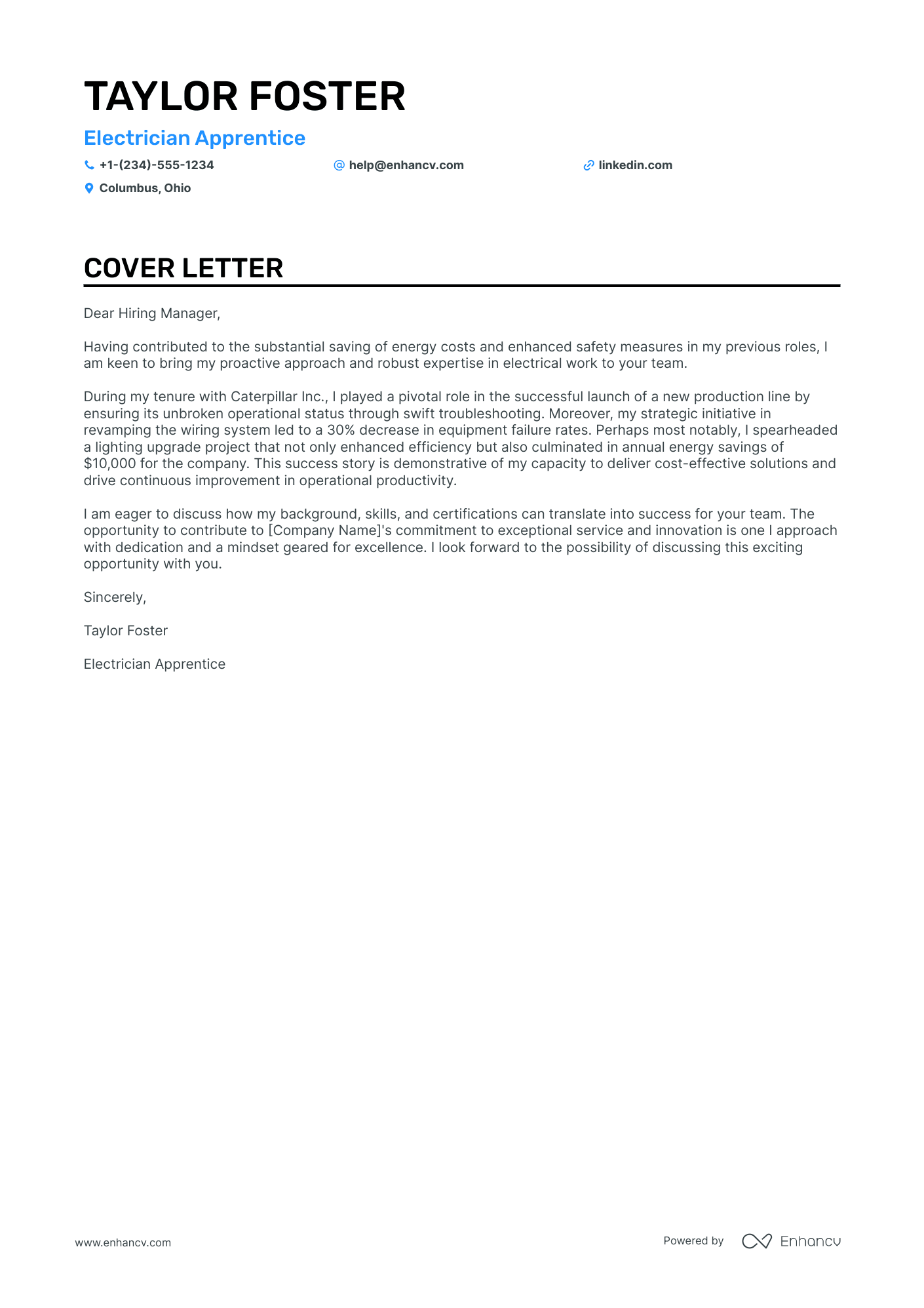When you're ready to apply for that electrician job, you might be surprised to find a cover letter is required. This isn't just a repeat of your resume; it's your chance to shine. In just one page, transform your top professional triumph into a compelling narrative. Keep it formal and ditch the clichés—captivate, don't bore. Let's navigate this crucial step together and wire your cover letter for success.
- Writing the essential electrician cover letter sections: balancing your professionalism and personality;
- Mixing storytelling, your unique skill set, and your greatest achievement;
- Providing relevant (and interesting) information with your electrician cover letter, despite your lack of professional experience;
- Finding the perfect format for your[ electrician cover letter, using templates from industry experts.
Leverage the power of Enhancv's AI: upload your resume and our platform will map out how your electrician cover letter should look, in mere moments.
If the electrician isn't exactly the one you're looking for we have a plethora of cover letter examples for jobs like this one:
- Electrician resume guide and example
- Housekeeping Manager cover letter example
- Regional Property Manager cover letter example
- Electrician Apprentice cover letter example
- Maintenance Manager cover letter example
- Hotel Housekeeping cover letter example
- Housekeeping Supervisor cover letter example
- Resident Assistant cover letter example
- Facilities Coordinator cover letter example
- Maintenance Technician cover letter example
- Landscaping cover letter example
Drop your resume here or choose a file.
PDF & DOCX only. Max 2MB file size.
Electrician cover letter example
Ethan Smith
San Antonio, Texas
+1-(234)-555-1234
help@enhancv.com
- Emphasis on Relevant Experience: The cover letter highlights the candidate's previous experience with retrofitting commercial electrical systems to be more energy-efficient, which showcases his capability to contribute to similar projects within the hiring company, aligning with their commitment to innovation.
- Quantifiable Achievements: Mentioning specific results, such as reducing energy costs by 25% and increasing project delivery efficiency by 20%, provides tangible evidence of the candidate's impact and expertise in the field.
- Alignment with Company's Mission: The cover letter references the candidate's admiration for the company's innovative approach, indicating that his professional values and the company's objectives are in sync, thereby suggesting a good cultural fit.
- Readiness to Contribute: The candidate expresses a proactive attitude by stating a willingness to discuss how his background and skills can benefit the company, showing enthusiasm and preparedness for the role of Journey-Level Electrician.
What about your electrician cover letter format: organizing and structuring your information
Here is one secret you should know about your electrician cover letter assessment. The Applicant Tracker System (or ATS) won't analyze your cover letter.
You should thus focus on making an excellent impression on recruiters by writing consistent:
- Header
- Greeting
- Introduction
- Body paragraphs (and explanation)
- Promise or Call to action
- Signature (that's optional)
Now, let's talk about the design of your electrician cover letter.
Ensure all of your paragraphs are single-spaced and have a one-inch margins on all sides (like in our cover letter templates).
Also, our cover letter builder automatically takes care of the format and comes along with some of the most popular (and modern) fonts like Volkhov, Chivo, and Bitter.
Speaking of fonts, professionals advise you to keep your electrician cover letter and resume in the same typography and avoid the over-used Arial or Times New Roman.
When wondering whether you should submit your electrician cover letter in Doc or PDF, select the second, as PDF keeps all of your information and design consistent.
Skip the hassle of writing a cover letter. Use our free cover letter generator and get it done in moments.
The top sections on a electrician cover letter
- Header: Include your full name, contact information, and date, which ensure the employer can easily identify you and get in touch for follow-up interviews or queries related to your application as an electrician.
- Greeting: Address the hiring manager or company by name whenever possible; this shows attention to detail and a personalized approach, both of which are valued skills in the electrical field.
- Introduction: Briefly mention your interest in the electrical position and state your current certification or licensing status; this immediately confirms your eligibility for the role.
- Professional Experience and Skills: Highlight specific electrical projects, safety record, and technical skills that directly relate to the job requirements, demonstrating your competence and readiness for the position.
- Closing and Call to Action: Express enthusiasm for the opportunity to contribute to their team, reaffirm your qualifications, and request an in-person meeting or interview to discuss how your electrical expertise aligns with their needs.
Key qualities recruiters search for in a candidate’s cover letter
- Proficiency in electrical codes and regulations: Recruiters look for electricians who are knowledgeable about the latest electrical codes and safety standards to ensure compliance and safety on the job.
- Experience with a variety of electrical systems: Having a broad range of experience with different electrical systems, including residential, commercial, and industrial, makes an electrician versatile and valuable.
- Excellent troubleshooting skills: Electricians must be able to quickly diagnose and solve complex electrical issues, minimizing downtime and ensuring systems operate efficiently.
- Attention to detail: The intricacies of electrical work require a meticulous approach to ensure that all components are installed correctly and safely.
- Commitment to safety: An electrician must prioritize safety, including the use of personal protective equipment and the implementation of best practices to protect themselves and others on the job.
- Effective communication skills: Electricians need to communicate clearly with customers, team members, and other tradespeople, which is essential for coordinating projects and ensuring customer satisfaction.
How to personalize your electrician cover letter greeting
Before you start writing your electrician cover letter, take the time to find out who is recruiting for the role.
Search for the recruiter's name on LinkedIn or the corporate website to address them personally in your electrician cover letter salutation.
What if you can't find out who's recruiting for the role?
Always aim to avoid the very impersonal "Dear Sir/Madam" - instead, opt out for "Dear HR Team" or "Dear Hiring Manager" to make a better first impression.
List of salutations you can use
- Dear Hiring Manager,
- Dear [Company Name] Recruiter,
- Dear [Mr./Ms./Dr.] [Last Name],
- Dear [Job Title] Hiring Team,
- Dear [Department] Team,
What to include in those first two sentences, or your electrician cover letter introduction
Have you ever wondered what the best way is to present your profile in the electrician cover letter introduction?
There's no right or wrong answer if you're being concise and authentic to yourself.
Some professionals start their electrician cover letter by:
- congratulating the company - focusing on something impressive, whether that's an award, an industry-leading project, or a key event;
- aligning their passion for the field or industry with the job - if you're enthusiastic about what you do, you'd thus grow your skill set and value as a professional.
What to write in the middle or body of your electrician cover letter
Here's where it gets tricky.
Your electrician cover letter body should present you in the best light possible and, at the same time, differ from your resume.
Don't be stuck in making up new things or copy-pasting from your resume. Instead, select just one achievement from your experience.
Use it to succinctly tell a story of the job-crucial skills and knowledge this taught you.
Your electrician cover letter is the magic card you need to further show how any organization or team would benefit from working with you.
Thinking about the closing paragraph of your electrician cover letter
Before your signature, you have extra space to close off your electrician cover letter.
Use it to either make a promise or look to the future.
Remind recruiters how invaluable of a candidate you are by showing what you plan to achieve in the role.
Also, note your availability for a potential next meeting (in person or over the telephone).
By showing recruiters that you're thinking about the future, you'd come off as both interested in the opportunity and responsible.
Keep this in mind when writing your zero experience electrician cover letter
Even though you may not have any professional experience, your electrician cover letter should focus on your value.
As a candidate for the particular role, what sort of skills do you bring about? Perhaps you're an apt leader and communicator, or have the ability to analyze situations from different perspectives.
Select one key achievement from your life, outside work, and narrate a story that sells your abilities in the best light.
If you really can't think of any relevant success, you could also paint the picture of how you see your professional future developing in the next five years, as part of the company.
Key takeaways
We hope this electrician cover letter writing guide has shown you how to:
- Format your electrician cover letter with the mandatory sections (e.g. header, greeting, intro, body, and closing) and select the right font (P.S. It should be the same as the one you've used for your resume);
- Substitute your lack of professional experience with your most noteworthy achievement, outside of work, or your dreams and passions;
- Ensure recruiters have a more personalized experience by tailoring your cover letter not just to the role, but to them (e.g. writing their first/last name in the salutation, etc.);
- Introducing your biggest achievement and the skills it has taught you in your electrician cover letter body;
- Write no more than two sentences in your electrician cover letter introduction to set the right tone from the get-go.
Electrician cover letter examples
By Role







